Key takeaways:
- Community engagement fosters collective action through shared stories and listening, highlighting the importance of individual voices.
- Anti-war activism raises awareness of the human costs of war, fostering solidarity and critical dialogue among diverse communities.
- Building local coalitions enhances activism efforts by leveraging individual strengths and creating a powerful force for change.
- Sharing personal stories and organizing community events can foster understanding, empathy, and a deeper commitment to activism.
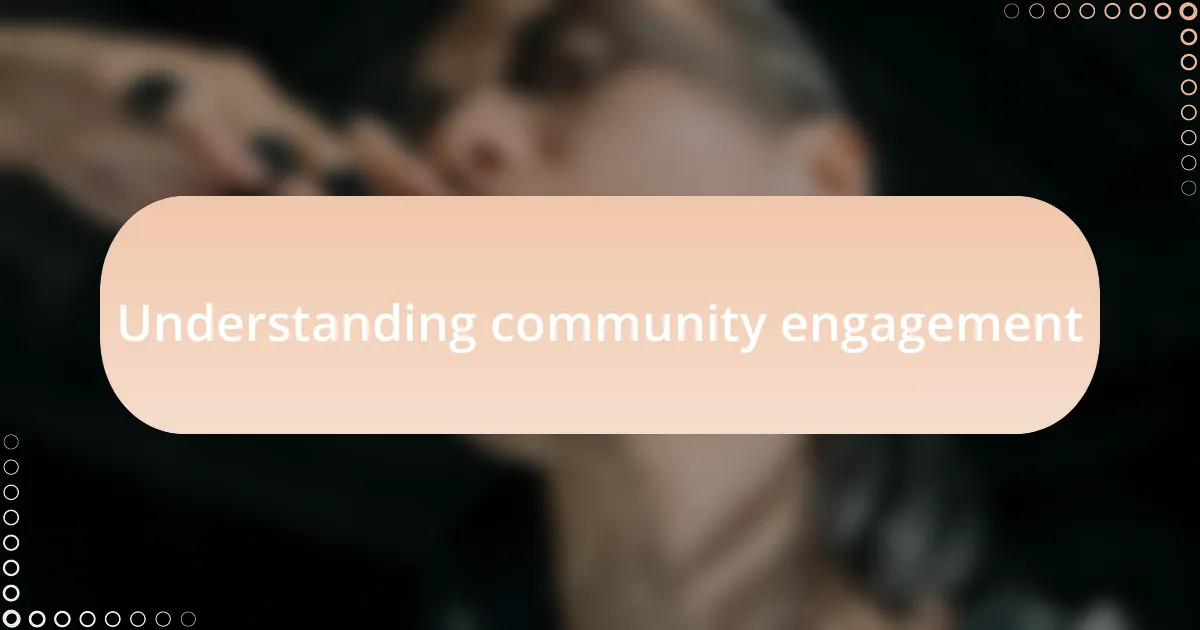
Understanding community engagement
Community engagement is all about building relationships and fostering connections that inspire collective action. In my experience, when I actively participated in local gatherings, I discovered that sharing our stories not only brought people together, but also highlighted our shared struggles against war. How often do we think about the power of a single conversation in igniting change?
It’s easy to underestimate the value of each individual voice within a community. I remember distinctly the first town hall meeting I attended related to anti-war efforts; it was an eye-opening moment to see how various perspectives collided yet harmonized when we focused on common goals. Here, I learned that community engagement is not just about noise; it’s about harmony and understanding the power of listening.
Engaging with my community has also taught me that challenges can become our greatest catalysts. The frustration I faced when organizing a rally reminded me that community involvement is rarely smooth sailing. Yet, perseverance, open dialogue, and shared enthusiasm transformed those obstacles into bonds of unity, proving that when we stand together, we become a formidable force for change.
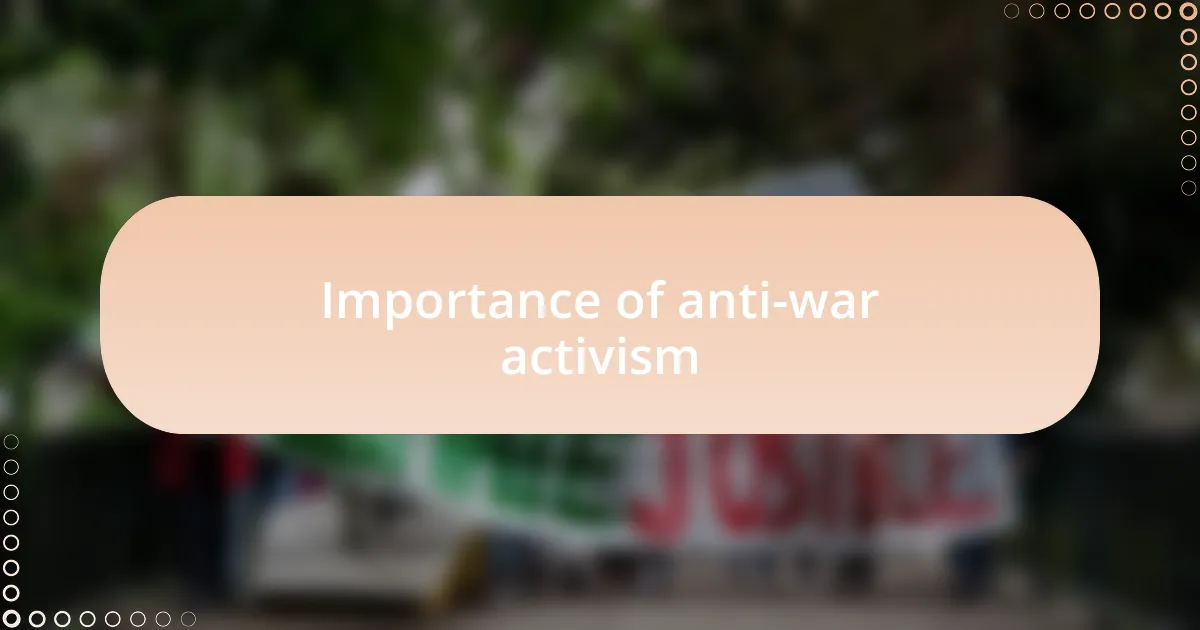
Importance of anti-war activism
Anti-war activism plays a crucial role in raising awareness about the impacts of war, often shining a light on the human costs that go unnoticed. I recall attending a vigil for victims of conflict, where the atmosphere was heavy with emotion. In moments like these, it became clear that each candle lit represented not just a life lost, but stories, dreams, and families shattered by violence. How often do we stop to consider the faces behind the statistics we hear on the news?
Moreover, anti-war activism fosters solidarity among diverse communities. I had the privilege of working alongside individuals from various backgrounds, each bringing unique perspectives and experiences to the table. When we united our voices for peace, I felt an electric shift; it was as if we became a singular entity advocating for a common cause, reminding ourselves and others that peace is not merely an absence of war but a collective commitment to understanding and compassion.
In my journey, I’ve seen how anti-war activism cultivates critical dialogues about justice and humanity. Participating in discussions facilitated by local groups opened my eyes to the complexities of conflict. I often wonder: what if we invested as much energy into dialogue as we do into debate? Those heartfelt exchanges reinforce the idea that promoting peace is not just an act of resistance, but a vibrant expression of our shared humanity and desire for a better world.
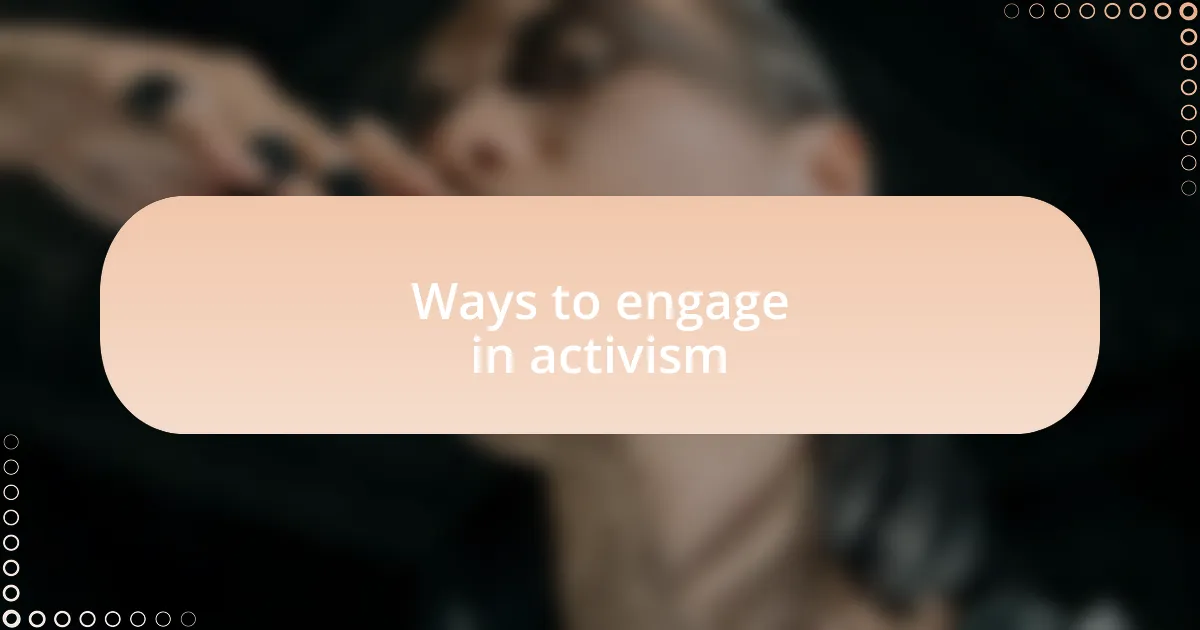
Ways to engage in activism
One impactful way to engage in activism is by participating in local community events. I remember volunteering at a peace rally where we organized workshops on the effects of war on mental health. Witnessing people’s growing awareness and willingness to discuss such a sensitive topic was a powerful reminder of our shared responsibility to foster understanding and healing within our communities.
Social media activism also plays a significant role in how we engage today. I’ve found that sharing personal stories about the impacts of war on families can resonate deeply with others. It’s fascinating to see how a single post can ignite conversations far beyond my immediate circle, reminding me that each voice holds the power to influence and inspire change.
Additionally, consider collaborating with established organizations that align with your values. Joining forces amplifies your message and builds a stronger movement. I once partnered with a local NGO focused on refugee support, which broadened my perspective on the issue. Have you ever thought about how collaboration can enrich your understanding of activism? It opens doors to invaluable insights and connections that may transform your approach entirely.
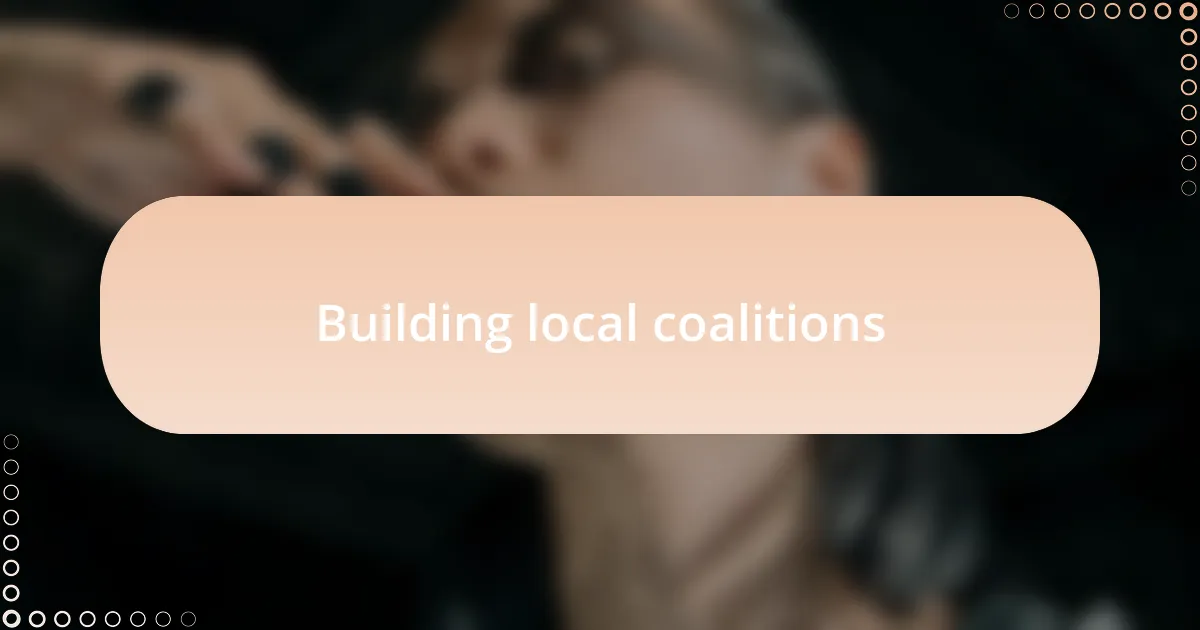
Building local coalitions
Building local coalitions is essential for creating a strong foundation in any activism effort. When I first got involved in anti-war activism, I reached out to neighbors, friends, and local leaders, seeking common ground. It amazed me how quickly a diverse group of individuals could unite around shared values, demonstrating that when people come together, they can create a powerful force for change.
I recall a particular instance where we hosted a community meeting, inviting anyone interested in discussing our thoughts on war and its impact. The sense of camaraderie that developed was palpable. Each voice shared unique experiences and perspectives, enriching the dialogue. Have you ever noticed how a simple gathering can spark innovative ideas and strategies that we might not have considered alone? It’s moments like these that reinforce the importance of building local coalitions.
Moreover, leveraging the strengths of each coalition member can amplify the impact of our efforts. I remember when one member brought in their expertise in local outreach, while another contributed skills in graphic design for our promotional materials. The collaboration not only energized our cause but also deepened my understanding of each person’s role. Isn’t it fascinating how together, we can accomplish so much more than we ever could individually?
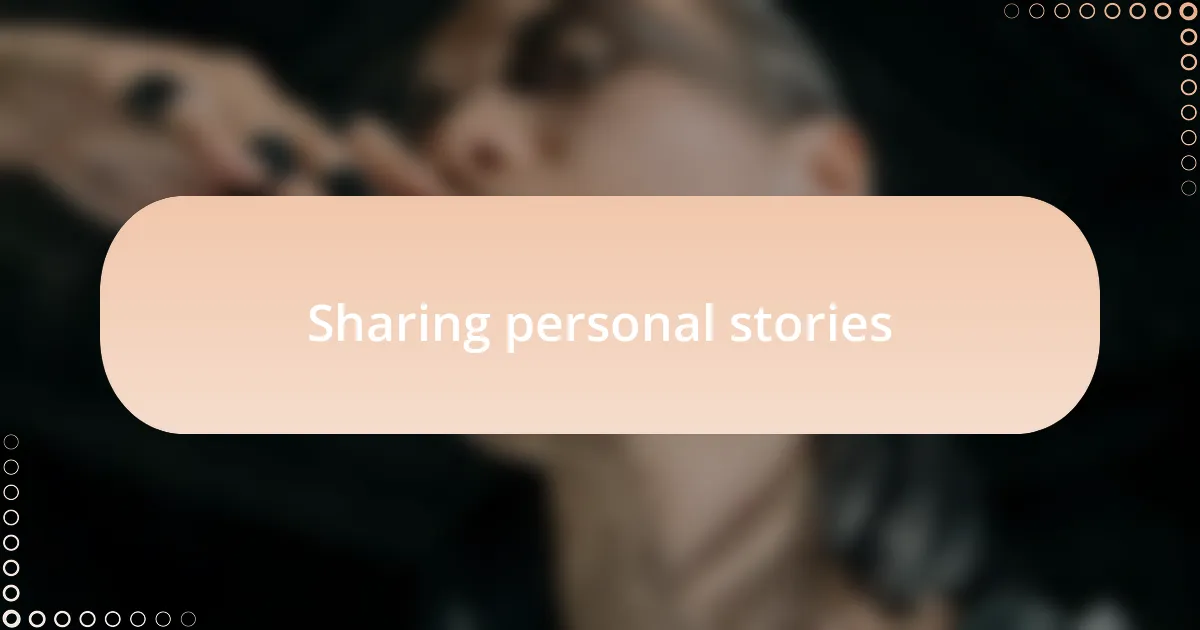
Sharing personal stories
Sharing personal stories can be a powerful way to connect with others in the anti-war movement. I remember sitting in a small café where a fellow activist recounted how her grandfather had served in a war, returning home not as a hero but as a man haunted by memories. Her candid vulnerability struck a chord with everyone, creating a safe space for others to share their own experiences. Have you ever felt that moment when a simple story can break down barriers and foster understanding?
Reflecting on similar gatherings, I often think about how our collective narratives weave a tapestry of shared emotions and experiences. At one such meeting, I shared my experience of attending a peace vigil that initially felt lonely. As I opened up, I saw nods of recognition and empathy from others. It’s incredible how individual tales can highlight the common threads of fear, hope, and resilience. I believe that sharing these stories isn’t just about recounting what happened; it’s about building empathy and solidarity among us.
On another occasion, during a community event, I witnessed a young man recount his struggles with the impact of military actions on his family. The rawness of his emotions brought tears to many eyes. It made me realize how impactful storytelling can be in rallying support and encouraging meaningful conversations. Have you ever considered how your own story could inspire someone else to engage in activism? Each person’s narrative has the potential to be a catalyst for change, igniting passion and commitment in others.
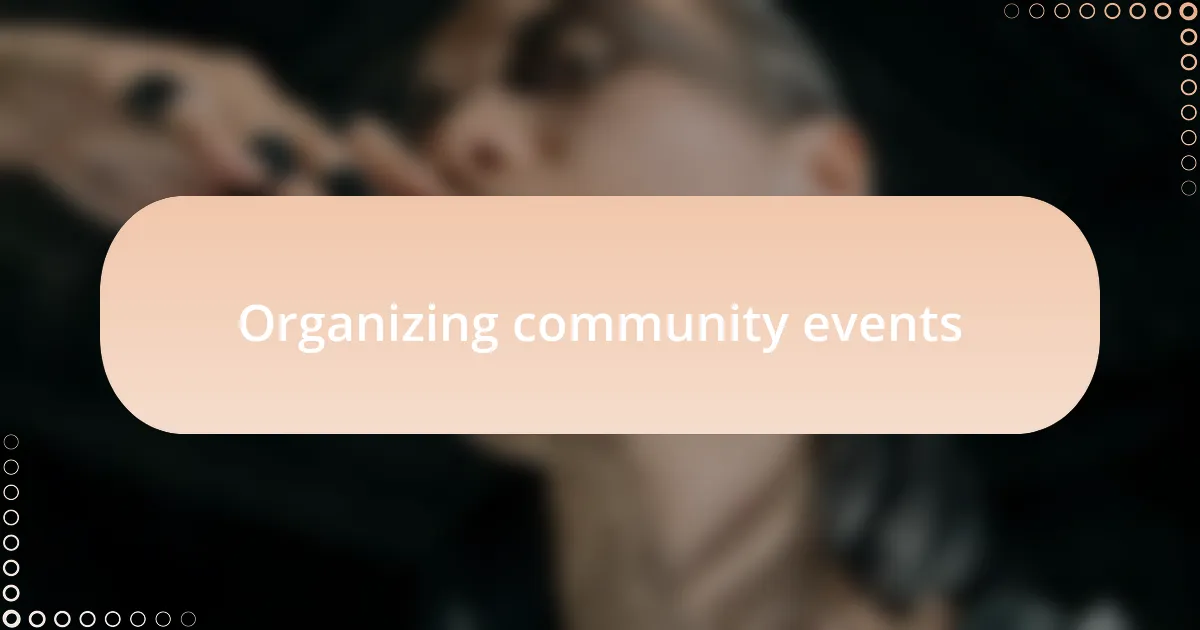
Organizing community events
Organizing community events is not just about gathering people; it’s about creating a space where voices can be heard and ideas can flourish. I recall organizing a local workshop focused on the effects of war on mental health, where we brought in speakers from different backgrounds. The discussions felt alive, charged with shared passion, and I could see participants beginning to think critically about the issues at hand. Have you ever considered how a simple event can plant the seeds of change in someone’s heart?
The energy at our events often surprised me. During a peace rally I helped coordinate, the feeling of unity was palpable as we marched together, holding signs with messages of hope and solidarity. I remember a participant saying she had never felt so empowered before. It’s moments like these that affirm the importance of community engagement—showing people that they are not alone in their beliefs and that collective action holds immense power. What does empowerment feel like for you?
At another event—a cooking night where we prepared meals inspired by different cultures affected by conflict—I witnessed connections forming over shared recipes and stories. The laughter and warmth in the room were both heartwarming and enlightening, making everyone realize that we can find common ground, even through something as simple as food. Looking back, I see how those small gatherings can lead to lasting bonds and a deeper commitment to our cause. Isn’t it amazing how a shared meal can ignite a fire for activism?
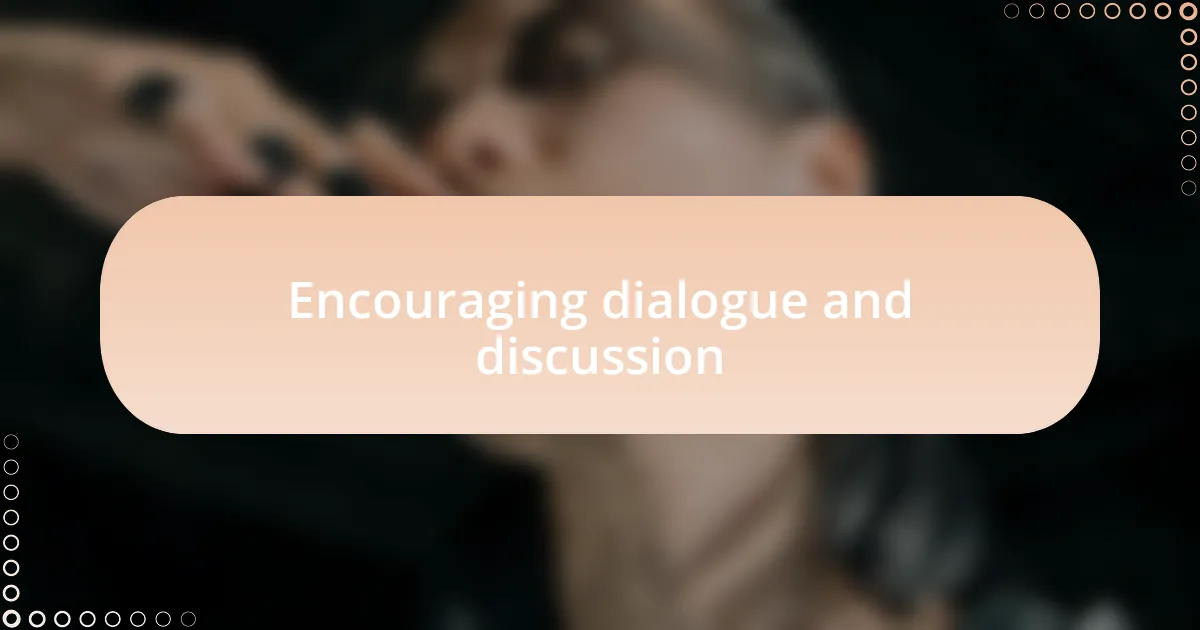
Encouraging dialogue and discussion
Encouraging dialogue and discussion within our community starts with creating the right environment. I remember attending a community forum designed to address local concerns about military recruitment. The atmosphere was filled with anticipation, and as people began to share their stories, it was as if a weight had been lifted. Have you ever felt the power of stories being shared openly? It truly emphasizes how dialogue can break down barriers and foster understanding.
An engaging conversation can spark new ideas and bridge divides. I hosted a series of discussion circles where participants openly discussed their perspectives on foreign policy. It was remarkable how differing viewpoints could coexist in a respectful space. One participant remarked that hearing the concerns of others changed the way they viewed certain issues. Isn’t it fascinating how dialogue can reshape our perspectives?
Moreover, I learned that asking open-ended questions is a great way to deepen the conversation. During a recent discussion, I prompted the group with: “What does peace mean to you in your daily life?” The responses were rich and varied, illuminating each individual’s journey. These moments of reflection not only emphasize our shared humanity but also strengthen our resolve to advocate for a world without war. Don’t you think that our personal experiences can guide us to be better activists?